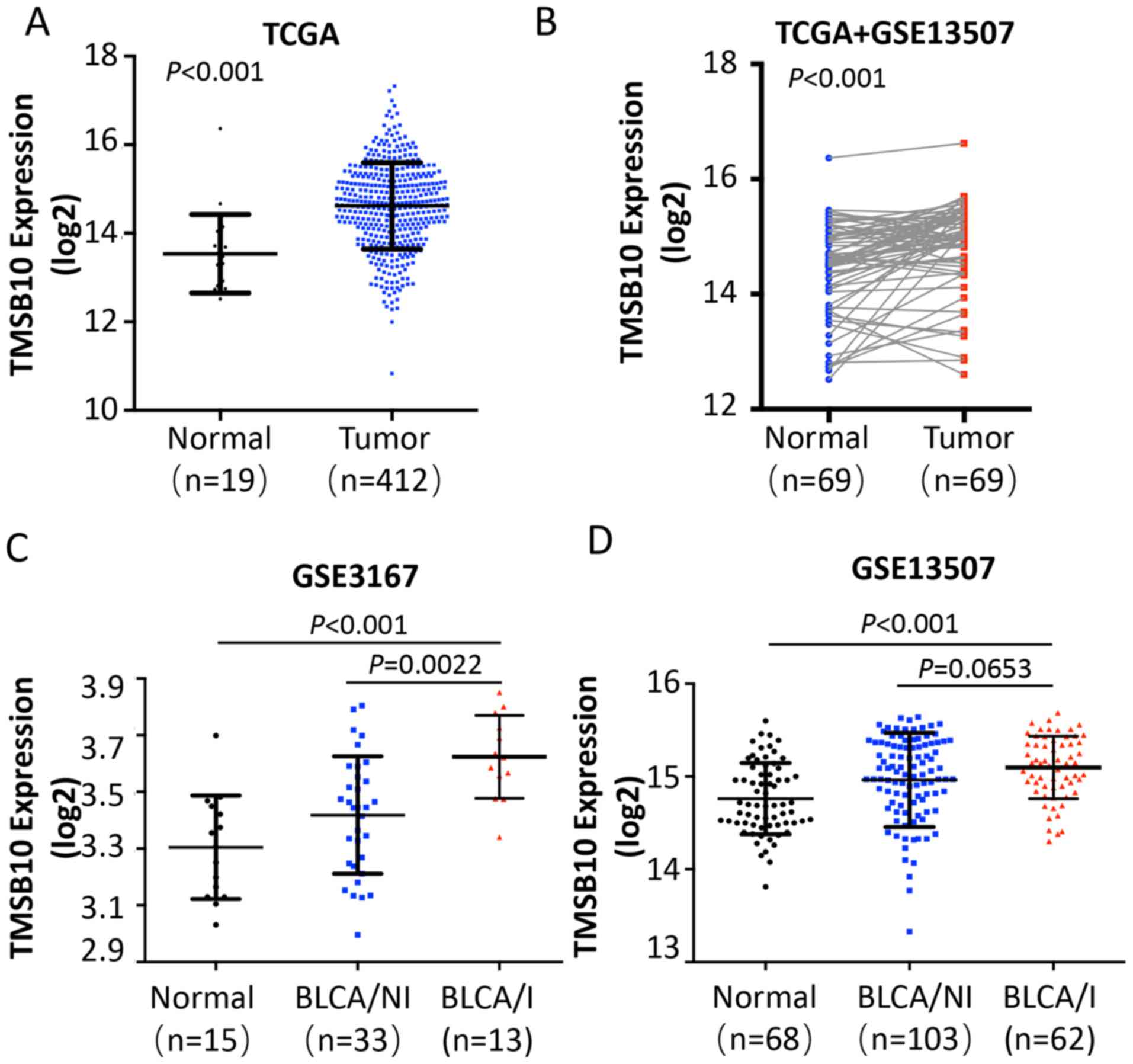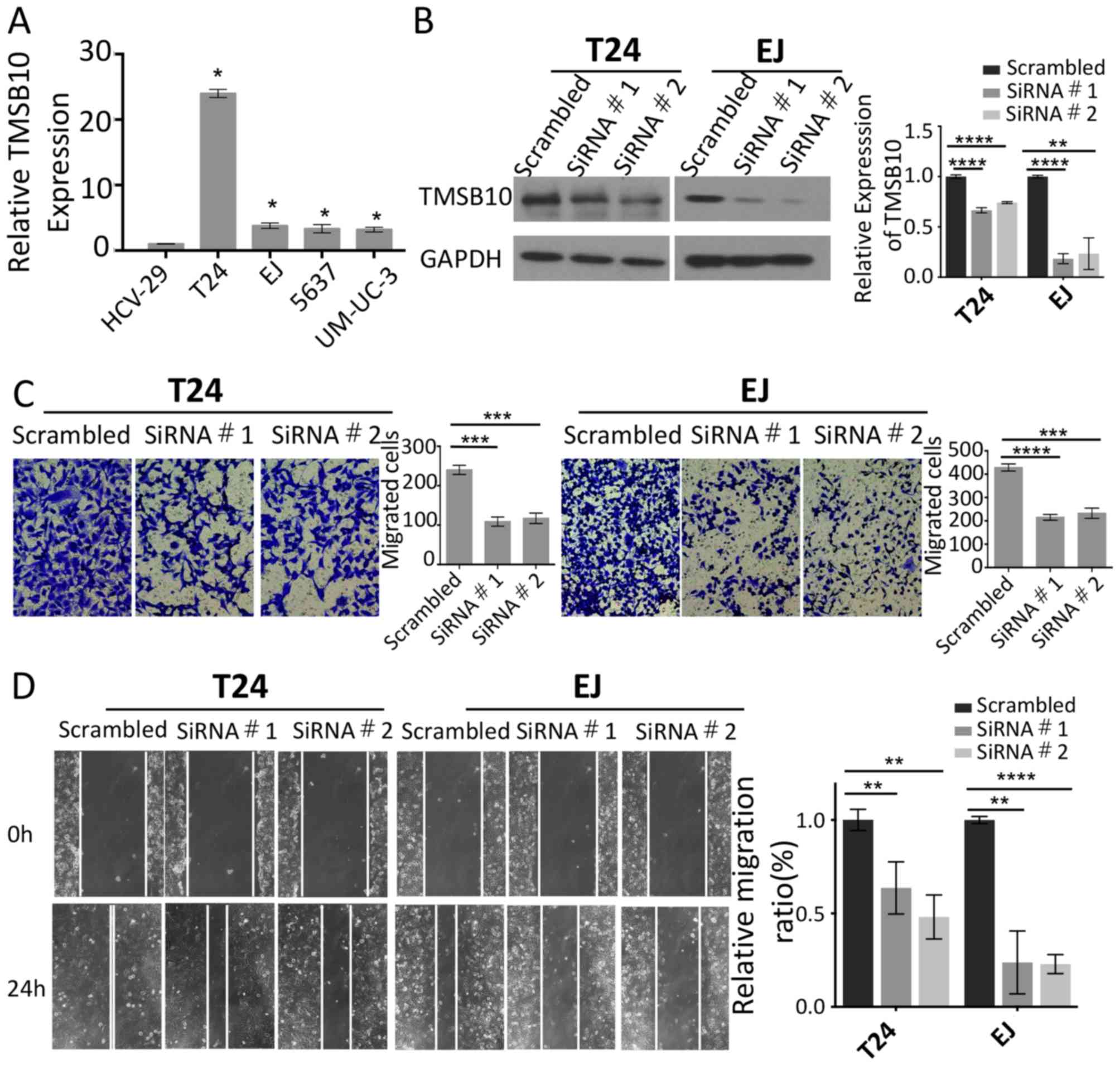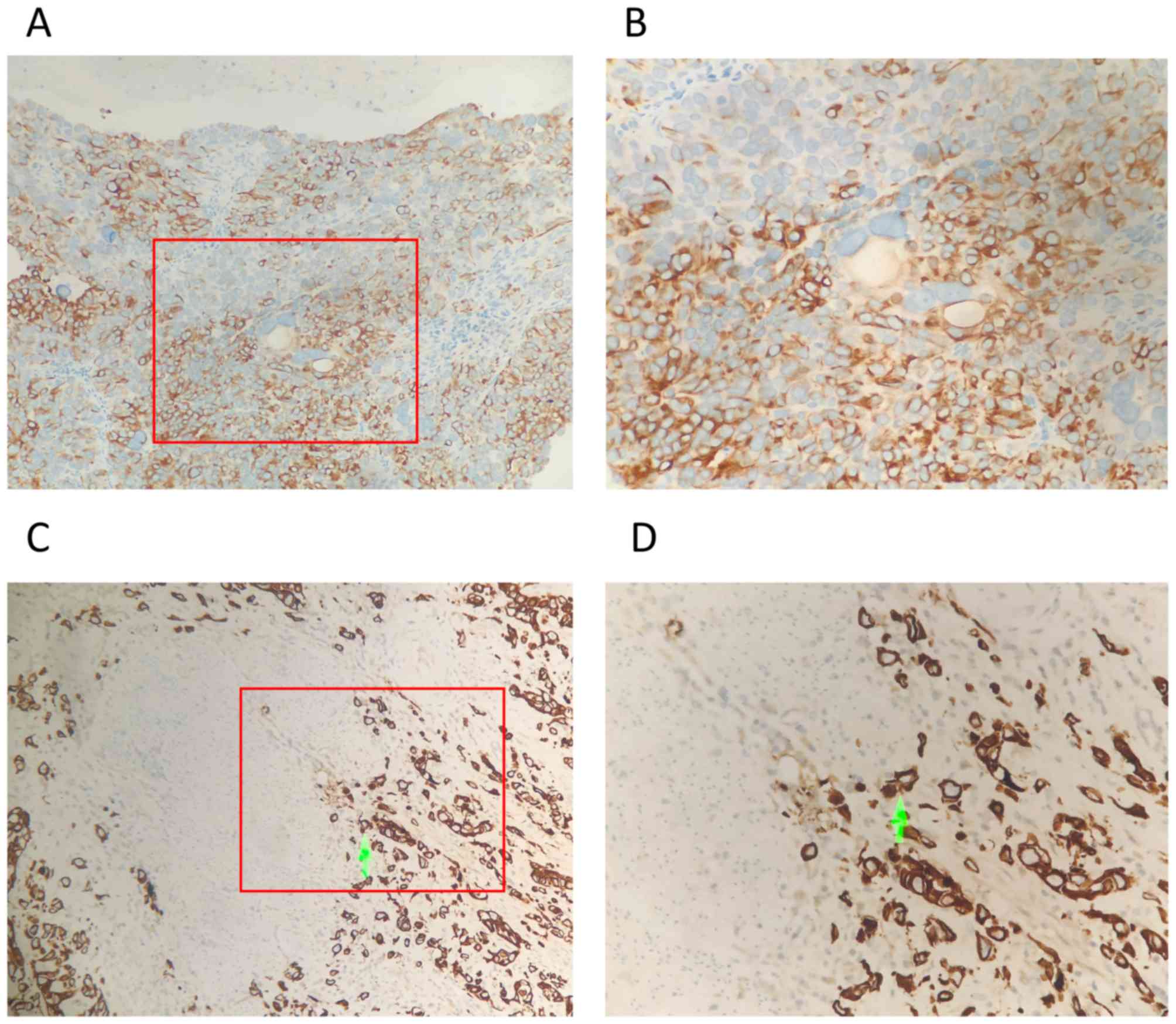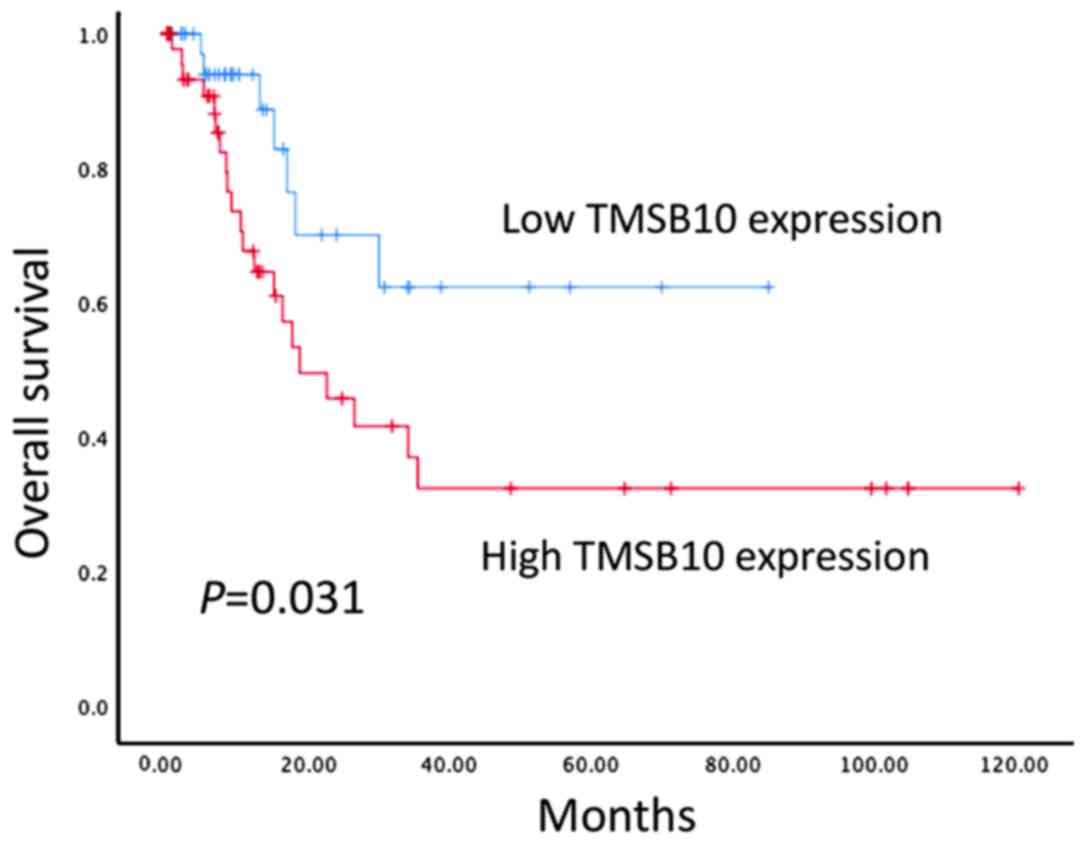|
1
|
Antoni S, Ferlay J, Soerjomataram I, Znaor
A, Jemal A and Bray F: Bladder cancer incidence and mortality: A
global overview and recent trends. Eur Urol. 71:96–108. 2017.
View Article : Google Scholar : PubMed/NCBI
|
|
2
|
Siegel RL, Miller KD and Jemal A: Cancer
statistics, 2017. CA Cancer J Clin. 67:7–30. 2017. View Article : Google Scholar : PubMed/NCBI
|
|
3
|
Miller KD, Siegel RL, Lin CC, Mariotto AB,
Kramer JL, Rowland JH, Stein KD, Alteri R and Jemal A: Cancer
treatment and survivorship statistics, 2016. CA Cancer J Clin.
66:271–289. 2016. View Article : Google Scholar : PubMed/NCBI
|
|
4
|
Bellmunt J and Petrylak DP: New
therapeutic challenges in advanced bladder cancer. Semin Oncol.
39:598–607. 2012. View Article : Google Scholar : PubMed/NCBI
|
|
5
|
Goldstein AL, Slater FD and White A:
Preparation, assay, and partial purification of a thymic
lymphocytopoietic factor (thymosin). Proc Natl Acad Sci USA.
56:1010–1017. 1966. View Article : Google Scholar : PubMed/NCBI
|
|
6
|
Erickson-Viitanen S, Ruggieri S, Natalini
P and Horecker BL: Thymosin beta 10, a new analog of thymosin beta
4 in mammalian tissues. Arch Biochem Biophys. 225:407–413. 1983.
View Article : Google Scholar : PubMed/NCBI
|
|
7
|
Weterman MA, van Muijen GN, Ruiter DJ and
Bloemers HP: Thymosin beta-10 expression in melanoma cell lines and
melanocytic lesions: A new progression marker for human cutaneous
melanoma. Int J Cancer. 53:278–284. 1993. View Article : Google Scholar : PubMed/NCBI
|
|
8
|
Oien KA, Vass JK, Downie I, Fullarton G
and Keith WN: Profiling, comparison and validation of gene
expression in gastric carcinoma and normal stomach. Oncogene.
22:4287–4300. 2003. View Article : Google Scholar : PubMed/NCBI
|
|
9
|
Zhang X, Ren D, Guo L, Wang L, Wu S, Lin
C, Ye L, Zhu J, Li J, Song L, et al: Thymosin beta 10 is a key
regulator of tumorigenesis and metastasis and a novel serum marker
in breast cancer. Breast Cancer Res. 19:152017. View Article : Google Scholar : PubMed/NCBI
|
|
10
|
Liu CR, Ma CS, Ning JY, You JF, Liao SL
and Zheng J: Differential thymosin beta 10 expression levels and
actin filament organization in tumor cell lines with different
metastatic potential. Chin Med J (Engl). 117:213–218.
2004.PubMed/NCBI
|
|
11
|
Theunissen W, Fanni D, Nemolato S, Di
Felice E, Cabras T, Gerosa C, Van Eyken P, Messana I, Castagnola M
and Faa G: Thymosin beta 4 and thymosin beta 10 expression in
hepatocellular carcinoma. Eur J Histochem. 58:22422014. View Article : Google Scholar : PubMed/NCBI
|
|
12
|
Takano T, Hasegawa Y, Miyauchi A,
Matsuzuka F, Yoshida H, Kuma K and Amino N: Quantitative analysis
of thymosin beta-10 messenger RNA in thyroid carcinomas. Jpn J Clin
Oncol. 32:229–232. 2002. View Article : Google Scholar : PubMed/NCBI
|
|
13
|
Califano D, Monaco C, Santelli G, Giuliano
A, Veronese ML, Berlingieri MT, de Franciscis V, Berger N, Trapasso
F, Santoro M, et al: Thymosin beta-10 gene overexpression
correlated with the highly malignant neoplastic phenotype of
transformed thyroid cells in vivo and in vitro. Cancer Res.
58:823–828. 1998.PubMed/NCBI
|
|
14
|
Sribenja S, Li M, Wongkham S, Wongkham C,
Yao Q and Chen C: Advances in thymosin beta10 research:
Differential expression, molecular mechanisms, and clinical
implications in cancer and other conditions. Cancer Invest.
27:1016–1022. 2009. View Article : Google Scholar : PubMed/NCBI
|
|
15
|
Sribenja S, Wongkham S, Wongkham C, Yao Q
and Chen C: Roles and mechanisms of β-thymosins in cell migration
and cancer metastasis: An update. Cancer Invest. 31:103–110. 2013.
View Article : Google Scholar : PubMed/NCBI
|
|
16
|
Sobin LH, Gospodarowicz MK and Wittekind
C: International against cancer (UICC). TNM classification of
malignant tumours. 7th edn. New York. Wiley2009.
|
|
17
|
Livak KJ and Schmittgen TD: Analysis of
relative gene expression data using real-time quantitative PCR and
the 2(-Delta Delta C(T)) method. Methods. 25:402–408. 2001.
View Article : Google Scholar : PubMed/NCBI
|
|
18
|
Jemal A, Siegel R, Ward E, Hao Y, Xu J,
Murray T and Thun MJ: Cancer statistics, 2008. CA Cancer J Clin.
58:71–96. 2008. View Article : Google Scholar : PubMed/NCBI
|
|
19
|
Lee SH, Zhang W, Choi JJ, Cho YS, Oh SH,
Kim JW, Hu L, Xu J, Liu J and Lee JH: Overexpression of the
thymosin beta-10 gene in human ovarian cancer cells disrupts
F-actin stress fiber and leads to apoptosis. Oncogene.
20:6700–6706. 2001. View Article : Google Scholar : PubMed/NCBI
|
|
20
|
Lee SH, Son MJ, Oh SH, Rho SB, Park K, Kim
YJ, Park MS and Lee JH: Thymosin {beta}(10) inhibits angiogenesis
and tumor growth by interfering with Ras function. Cancer Res.
65:137–148. 2005.PubMed/NCBI
|
|
21
|
Gu Y, Wang C, Wang Y, Qiu X and Wang E:
Expression of thymosin beta10 and its role in non-small cell lung
cancer. Hum Pathol. 40:117–124. 2009. View Article : Google Scholar : PubMed/NCBI
|
|
22
|
Zhang XJ, Su YR, Liu D, Xu DB, Zeng MS and
Chen WK: Thymosin beta 10 correlates with lymph node metastases of
papillary thyroid carcinoma. J Surg Res. 192:487–493. 2014.
View Article : Google Scholar : PubMed/NCBI
|


















